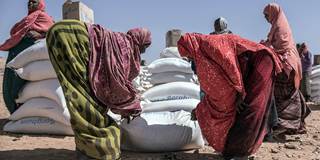Hosting large numbers of displaced people is a challenge, and giving them a path to self-sufficiency is the key to their livelihood and success. As more countries open their borders to refugees, there is increasing evidence of the economic benefits that inclusive policies can bring.
TORONTO – In January, Ethiopia’s parliament ratified legislation that gives refugees unprecedented rights, including the right to seek employment and education, and to move freely outside the confines of refugee settlements. The United Nations High Commissioner for Refugees (UNHCR) praised Ethiopia for having “one of the most progressive refugee policies in Africa” – one that could serve as a model for others.
Refugee-hosting countries around the globe should follow the example set by countries like Ethiopia and Uganda, in particular by giving refugees better access to formal jobs and schooling, and by seeking to host them in communities rather than camps. Such an approach would not only boost refugees’ self-reliance and sense of inclusion, but also benefit host countries.
Action is urgently needed. According to UNHCR, an all-time record of 68.5 million people worldwide, including 25.4 million refugees, have been forcibly displaced as a result of persecution, conflict, or generalized violence. Because most refugees won’t be able to return home, they need to build livelihoods in their host countries to provide for themselves and their families. But they often lack the opportunities to do so, resulting in generations of undereducated and underemployed adults.

TORONTO – In January, Ethiopia’s parliament ratified legislation that gives refugees unprecedented rights, including the right to seek employment and education, and to move freely outside the confines of refugee settlements. The United Nations High Commissioner for Refugees (UNHCR) praised Ethiopia for having “one of the most progressive refugee policies in Africa” – one that could serve as a model for others.
Refugee-hosting countries around the globe should follow the example set by countries like Ethiopia and Uganda, in particular by giving refugees better access to formal jobs and schooling, and by seeking to host them in communities rather than camps. Such an approach would not only boost refugees’ self-reliance and sense of inclusion, but also benefit host countries.
Action is urgently needed. According to UNHCR, an all-time record of 68.5 million people worldwide, including 25.4 million refugees, have been forcibly displaced as a result of persecution, conflict, or generalized violence. Because most refugees won’t be able to return home, they need to build livelihoods in their host countries to provide for themselves and their families. But they often lack the opportunities to do so, resulting in generations of undereducated and underemployed adults.